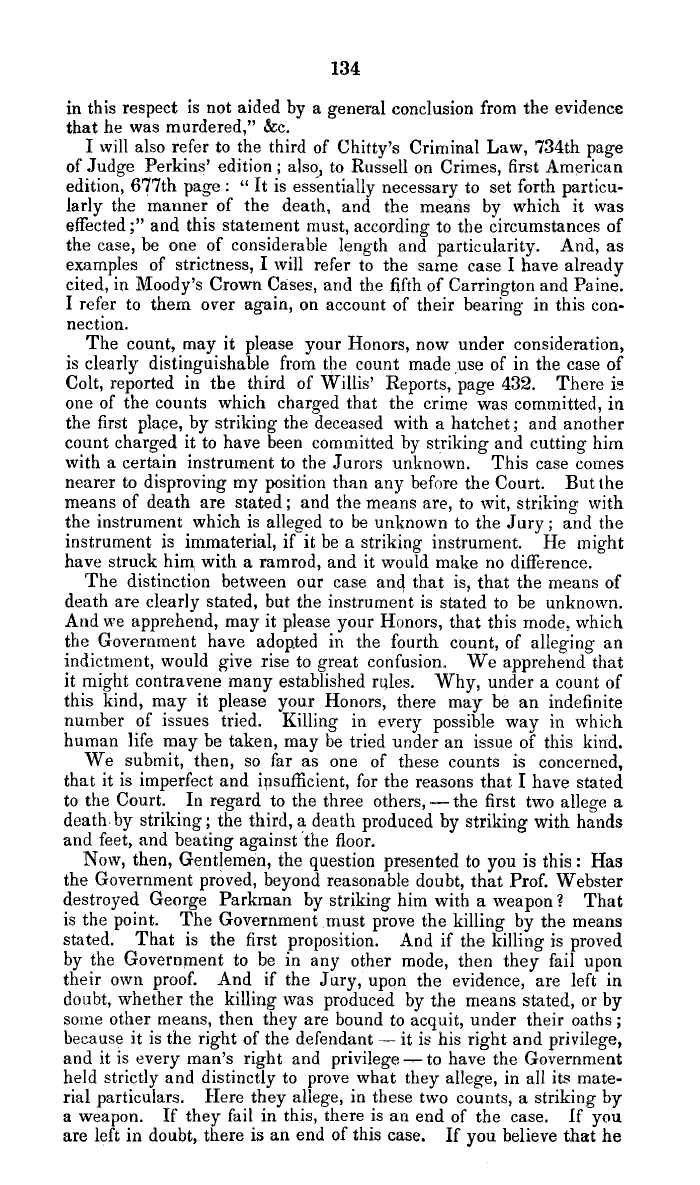|
134
in this respect is not aided by a general conclusion from the evidence
that he was murdered," &c.
I will also refer to the third of Chitty's Criminal Law, 734th page
of Judge Perkins' edition ; also, to Russell on Crimes, first American
edition, 677th page : " ° It is essentially necessary to set forth particu-
larly the manner of the death, and the means by which it was
effected;" and this statement must, according to the circumstances of
the case, be one of considerable length and particularity. And, as
examples of strictness, I will refer to the same case I have already
cited, in Moody's Crown Cases, and the fifth of Carrington and Paine.
I refer to them over again, on account of their bearing in this con-
nection.
The count, may it please your Honors, now under consideration,
is clearly distinguishable from the count made use of in the case of
Colt, reported in the third of Willis' Reports, page 432. There i=
one of the counts which charged that the crime was committed, in
the first place, by striking the deceased with a hatchet; and another
count charged it to have been committed by striking and cutting him
with a certain instrument to the Jurors unknown. This case comes
nearer to disproving my position than any before the Court. But the
means of death are stated; and the means are, to wit, striking with
the instrument which is alleged to be unknown to the Jury; and the
instrument is immaterial, if it be a striking instrument. He might
have struck him with a ramrod, and it would make no difference.
The distinction between our case and that is, that the means of
death are clearly stated, but the instrument is stated to be unknown.
And we apprehend, may it please your Honors, that this mode, which
the Government have adopted in the fourth count, of alleging an
indictment, would give rise to great confusion., We apprehend that
it might contravene many established rules. Why, under a count of
this kind, may it please your Honors, there may be an indefinite
number of issues tried. Killing in every possible way in which
human life may be taken, may be tried under an issue of this kind.
We submit, then, so far as one of these counts is concerned,
that it is imperfect and ipsufficient, for the reasons that I have stated
to the Court. In regard to the three others,-the first two allege a
death. by striking; the third, a death produced by striking with hands
and feet, and beating against the floor.
Now, then, Gentlemen, the question presented to you is this: Has
the Government proved, beyond reasonable doubt, that Prof. Webster
destroyed George Parkman by striking him with a weapon? That
is the point. The Government must prove the killing by the means
stated. That is the first proposition. And if the killing is proved
by the Government to be in any other mode, then they fail upon
their own proof. And if the Jury, upon the evidence, are left in
doubt, whether the killing was produced by the means stated, or by
some other means, then they are bound to acquit, under their oaths;
because it is the right of the defendant - it is his right and privilege,
and it is every man's right and privilege-to have the Government
held strictly and distinctly to prove what they allege, in all its mate-
rial particulars. Here they allege, in these two counts, a striking by
a weapon. If they fail in this, there is an end of the case. If you
are left in doubt, there is an end of this case. If you believe that he
|

